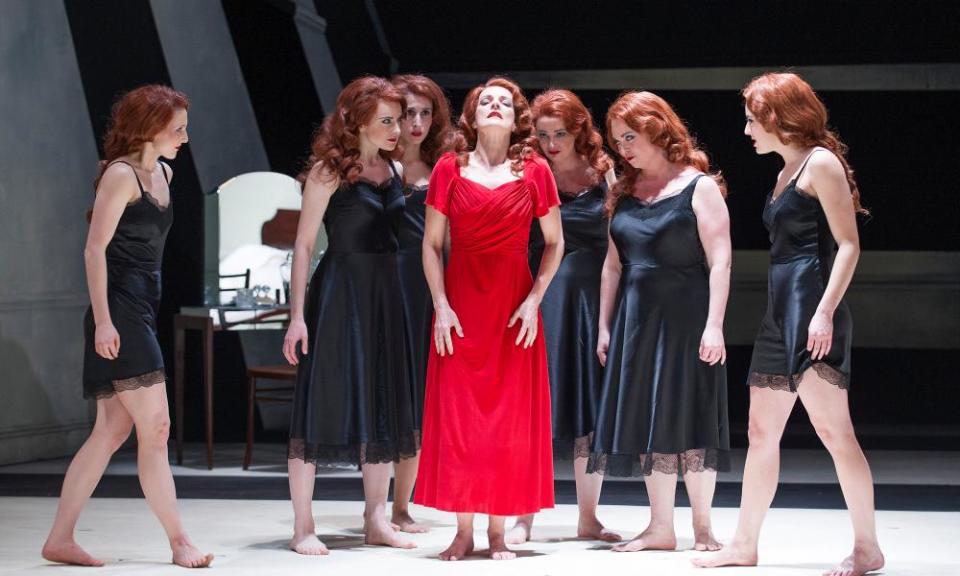Pamela Helen Stephen obituary

Mezzo-soprano who brought great dramatic insight to bear in operatic roles by composers ranging from Monteverdi to Britten
The mezzo-soprano Pamela Helen Stephen, who has died aged 57 of cancer, was a popular and admired figure on stages in Britain and abroad. Following her debut as Cathleen in Nicholas Maw’s The Rising of the Moon at Wexford in 1990, she made a number of appearances with Opera North, Welsh National and Scottish Operas before making her mark in a series of higher-profile roles.
Though not an early music specialist, she won considerable acclaim for the powerful way she inhabited the character of Penelope in the ENO production of Monteverdi’s The Return of Ulysses at the Young Vic, London, in 2011. In Benedict Andrews’ staging, screens on either side of her zoomed in on facial expressions and stage action, enabling the loyal wife’s long wait for her husband Ulysses to be depicted by Stephen with almost unbearable pathos.
She also received much praise in the title role of Handel’s Giulio Cesare at Opera North (2012), capturing not only Caesar’s assurance and arrogance but also a more pensive, vulnerable side of the character.
Such were her innate empathy and dramatic skills, however, that she was able to make an impression out of all proportion to the prominence of the role she was playing. Thus as Cio-Cio-San’s maid Suzuki in Madam Butterfly (ENO, 2012-13) her response to the unfolding tragedy was etched on her expressive face as well as being reflected in the colouring of each phrase. Similarly as Violetta’s maid Annina, she held the stage whenever on it in revivals of Richard Eyre’s production of La Traviata at the Royal Opera.

Stephen performed frequently in Australia too, where she lived for six months of the year with her husband since 1995, Richard Hickox, and their two children, Adam and Abigail, after his appointment in 2005 as musical director of Opera Australia. She sang the title role in Carmen in both Sydney and Melbourne, as well as Nicklausse/Muse in Offenbach’s Les Contes d’Hoffmann, and Sesto in Giulio Cesare. But in a campaign inspired by disaffected singers and a blatantly anti-British sentiment in some quarters of the community, Hickox was accused, among other things, of nepotism with regard to the casting of his wife in leading roles. Supported by the board, he rejected the charge.
Born in Solihull, Pamela was the daughter of Audrey Brown, a teacher who also sang for many years in the Edinburgh Festival Chorus, and William Stephen, a marketing director. When she was 10 the family moved to Scotland, where she attended Cults academy in Aberdeen, inspiring fellow pupils with her sparkling Maria in The Sound of Music. She then gained a bachelor’s degree in musical performance at the Royal Scottish Academy of Music and Drama, and subsequently studied opera, lieder and oratorio at the Opera Theater Center at Aspen, Colorado, with Herta Glaz, and at the University of Toronto with Patricia Kern.
Early performances with Opera North included the role of Cynthia in Benedict Mason’s football opera Playing Away, the Composer in Paul Griffiths’ Mozartian compilation The Jewel Box, Donna Clara in Roberto Gerhard’s The Duenna, where she made a striking impression in the neo-Baroque aria When Sable Night, Each Drooping Plant Restoring, and the travesti role of the pedlar Lazuli in Chabrier’s L’Étoile, where she was praised for her charisma and her success in somehow contriving “to combine gorgeous tone with a ripe Glaswegian brogue”.
A role in which she particularly excelled was that of Cherubino in Le Nozze di Figaro. As her recording on the Archiv label under John Eliot Gardiner demonstrates, she deftly caught the spirit of the lovesick adolescent’s confession in Non So Più, while her delivery of Voi Che Sapete was enlivened by the embarrassed giggles of the blushing page boy in the opening phrases.
Her extensive discography of more than 30 recordings also includes the Dryad in Strauss’s Ariadne auf Naxos under Richard Armstrong, the Child in Ravel’s L’Enfant et les Sortilèges under Previn, and Szymanowski’s Stabat Mater under Edward Gardner. Among the recordings she made under Hickox are numbered masses by Haydn, the role of Kate in Britten’s Owen Wingrave and music by Percy Grainger. She fully entered into the spirit of the latter’s shamelessly sentimental Colonial Song, her voice soaring seraphically while uttering timeless vocals such as “La, la, la” and “Da, dee, da”, as suggested by the composer.
Other relatively modest operatic roles she undertook with aplomb included Hécube in Berlioz’s Les Troyens at Covent Garden (2012), Martha in Gounod’s Faust (ENO, 2010) and Auntie in Peter Grimes, first at Hickox’s St Endellion Festival in 2008 and then five years later under Vladimir Jurowski with the LPO, on which occasion, looking rather more glamorous in a scarlet frock than the average landlady of the Boar, she conferred an amusingly vampish quality on the character. At the same time she brought a welcome freshness and lyricism to a part generally undertaken by plummier contraltos. She also took the role of Walt Disney’s wife in Philip Glass’s The Perfect American (ENO, 2013). On concert stages round the world her solo roles included Elgar’s Dream of Gerontius, Beethoven’s Ninth Symphony and Britten’s Spring Symphony.
Well regarded as a result of her infectious laughter and vivacity, she was, both in the rehearsal room and outside it, unfailingly supportive of colleagues, especially those less experienced than herself.
Hickox died in 2008. Stephenis survived by Adam and Abigail, and by her partner, Stephen Lumsden, chief executive of Intermusica Artists’ Management.
• Pamela Helen Stephen, mezzo-soprano, born 27 January 1964; died 30 November 2021

 Yahoo News
Yahoo News 